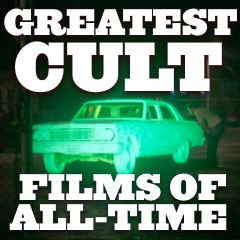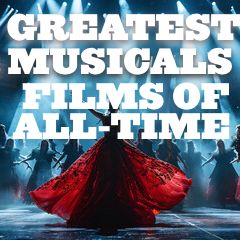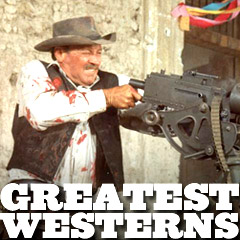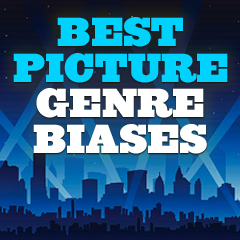
|
|
![]()
Genre Sub-Sections
Film Genres Overview | Main
Film Genres | Film Sub-Genres | Other
Major Film Categories | Film Sub-Genres
Types (and Hybrids)
Best Pictures - Genre Biases | Summary of Top Films by Genre | Top 100 Films by Genre | AFI's Top 10 Film Genres
Highest-Grossing
Films By Genre Type

|
The main film genres are the most common and identifiable film genre categories. Each of these main categories are fully described in this section. |
|||||||||||||||||||||

|
Sub-Genres are more specific sub-classes of the larger category of main film genres (above), with their own distinctive subject matter, style, formulas, and iconography. Some of them are very prominent and are on the verge of being considered main genres. |
|||||||||||||||||||||

|
There are many other (non-genre) film categories that cross-over many traditional genre film types, such as: animated films, UK films, classic films, family-oriented children's films, cult films, documentary films, serial films, sexual/erotic films, and silent films. |
|||||||||||||||||||||

|
There are dozens and dozens of film sub-genres types (and hybrids), that include films that combine different film elements or types together: e.g., action-comedies, zombie-disaster-thrillers, martial arts/kung-fu or video-game action films, musical dramas, espionage thrillers, black comedies, etc.). |
|||||||||||||||||||||

|
These are the top, highest-grossing (domestic) films in all the various sub-categories or genres (types of films). |
|||||||||||||||||||||

|
This section provides examples of all the top films (through history) of the main film genre categories. It presents an overview of the rankings of films in those genre categories that have been regarded as 'greatest' by other critics and film-makers' polls, box-office totals, awards organizations, and other tallies. |
|||||||||||||||||||||

|
||||||||||||||||||||||

|
Best Genre-Type Films: Comedy Films are "make 'em laugh" films designed to elicit laughter from the audience. Cinematic comedy can be considered the oldest film genre (and one of the most prolific and popular). Comedy was ideal for the early silent films, as it was dependent on visual action and physical humor rather than sound. This section is divided into two segments: Greatest Comedies (Pre-1960), and Greatest Comedies (Post-1960). Comedies are light-hearted dramas, crafted to amuse, entertain, and provoke enjoyment. The comedy genre humorously exaggerates the situation, the language, action, and characters. Comedies observe the deficiencies, foibles, and frustrations of life, providing merriment and a momentary escape from day-to-day life. They usually have happy endings, although the humor may have a serious or pessimistic side. |
|||||||||||||||||||||

|
Best Genre-Type Films: Cult Films have limited but very special appeal. Cult films are usually strange, quirky, offbeat, eccentric, oddball, or surreal, with outrageous, weird, unique and cartoony characters or plots, and garish sets. They are often considered controversial, dangerous or challenging because they step outside standard narrative and technical conventions. They can be very stylized, and are often transgressive, flawed or unusual in some striking way. |
|||||||||||||||||||||

|
Best Genre-Type Films: Classic film noir developed during and after World War II, taking advantage of the post-war ambience of anxiety, pessimism, and suspicion. It was a style of low-cost, B-list American films (the bottom of a double feature) that capitalized on advancements in film-making in the 20s and 30s, including synchronized sound, panchromatic (black and white) film stock with better light sensitivity, more compact lighting equipment, and cheaper on-location shoots. Film noir first evolved in the 1940s, became prominent in the post-war era, and lasted in a classic "Golden Age" period until the late 1950s. Film noirs have recently been released in the modern era and have been refashioned for present-day sensibilities. A number of them in the 60s-70s were hard-boiled policeman-hero films that contained film noirish characteristics. Most neo-noirs attempted to re-establish the moods and themes of classic noirs. So-called post-noirs (modern tech-noirs, neo-noirs, or cyberpunk) appeared after the classic period with an attempt to revive the themes of classic noir, although they portrayed contemporary times and were often filmed in color. |
|||||||||||||||||||||

|
Best Genre-Type Films: Musical/Dance Films are cinematic forms that emphasize and showcase full-scale song and dance routines in a significant way (usually with a musical or dance performance as part of the film narrative, or as an unrealistic "eruption" within the film). Or they are films that are centered on combinations of music, dance, song or choreography. In traditional musicals, cast members are ones who sing. Musicals highlight various musical artists or dancing stars, with lyrics that support the story line, often with an alternative, escapist vision of reality - a search for love, success, wealth, and popularity. This genre has been considered the most escapist of all major film genres. Tremendous film choreography and orchestration often enhances musical numbers. |
|||||||||||||||||||||

|
Best Genre-Type Films: Science Fiction Films are often quasi-scientific, visionary, comic-strip like and imaginative - and usually visualized through fanciful, imaginative settings, expert film production design, advanced technology gadgets (i.e., robots and spaceships, futuristic weapons), scientific developments, or by fantastic special effects. They are sometimes an offshoot of the more mystical fantasy films (or superhero films), or they share some similarities with action/adventure films. Science fiction often expresses the potential of technology to destroy humankind and easily overlaps with horror films, particularly when technology or alien life forms become malevolent, as in the "Atomic Age" of sci-fi films in the 1950s. Science-Fiction sub-categories abound: apocalyptic or dystopic, space-opera, futuristic noirs, speculative, etc. |
|||||||||||||||||||||

|
Best Genre-Type Films: Sports Films are those that have a sports setting (football or baseball stadium, arena, or the Olympics, etc.), competitive event (the 'big game,' 'fight,' or 'competition'), and/or athlete (boxer, racer, surfer, etc.) that are central and predominant in the story. Dramatic sports films or biographies have created memorable portraits of all-American sports heroes, individual athletes, or teams who are faced with tough odds in a championship match, race or large-scale sporting event, soul-searching or physical/psychological injuries, or romantic sub-plot distractions. Fictional sports films normally present a single sport (the most common being baseball, football, basketball, and boxing), and include the training and rise (and/or fall) of the underdog or champion in the world of sports |
|||||||||||||||||||||

|
Best Genre-Type Films: Filmsite has selected and described the most significant and influential, important, and milestone war films throughout cinematic history, each with a few screenshots and the title screen from the opening credits. |
|||||||||||||||||||||

|
Best Genre-Type Films: This descriptive, multi-part section provides a brief overview-history of the western film genre from the silent era to the present day. 100 of the greatest westerns ever made are presented in detail, with synopsis-plot reviews for each one. |
|||||||||||||||||||||

|
The American Film Institute in Los Angeles, California, in 2008 honored America’s 10 greatest films in 10 classic film genres. The jury was asked to choose up to 10 movies per genre from a comprehensive list. Ten genres were ultimately selected from 500 nominated films (50 from each genre): Animated, Fantasy, Gangster, Science Fiction, Western, Sports, Mystery, Romantic Drama, Courtroom Drama, and Epic. |
|||||||||||||||||||||

|
There are obvious biases in the selection of Best Picture winners by the Academy. Serious dramas or social-problem films with weighty inspirational themes, biopics (inspired by real-life individuals or events), or films with literary pretensions are much more likely to be nominated (and win). Glossy, large-scale epic historical productions with big budgets (of various genres) have often taken the Best Picture prize. Likewise for studio pictures with big stars - they are much preferred over quirky independent films, although that trend has begun to change in recent years. |
| Basis in Reality: | Non-Fictional (or Documentary), or Biopics; also Reality Films (or Movies) - derived from Reality TV | Fictional Film (also called Narrative Film); there are also Docu-Fiction or Docu-Dramas (part fiction, part documentary) or Semi-documentaries |
| Length: | Feature-length films | Shorts (or short subjects), anthology films (films with two or more discrete stories), or Serials |
| Audio: | Silents | Talkies |
| Quality and Funding: | 'A' (or first-run) pictures; mainstream (big-budget Hollywood) studio films, sometimes blockbusters; professionally-made films | 'B' pictures (and lower), also called B-movies, or even Z-movies; independent (aka indie), avant-garde or experimental-underground films (usually low-budget), or art-house films; amateur films or guerrilla-filmmaking |
| Visual Presentation: | Regular 2-D | 3-D or Stereoscopic |
| Color: | Black and white or monochrome | Color |
| Viewing Format: | Widescreen | 'Pan and Scan' formats |
| Type: | Animated films (hand-drawn, CGI, etc.) | Live-action (or un-animated) films |
| Language: | Domestic films | Foreign-language films (sub-titled or dubbed) |
| Originality: | Original version | Prequels, sequels, re-releases and remakes |
| Rating: | Rated films - regarding the degree of violence, profanity, or sexual situations within the film: G, PG, PG-13, R, NC-17, or X | Unrated films |
| Purpose: | Message Pictures (usually serious) or Propagandistic Films | Purely for Entertainment |